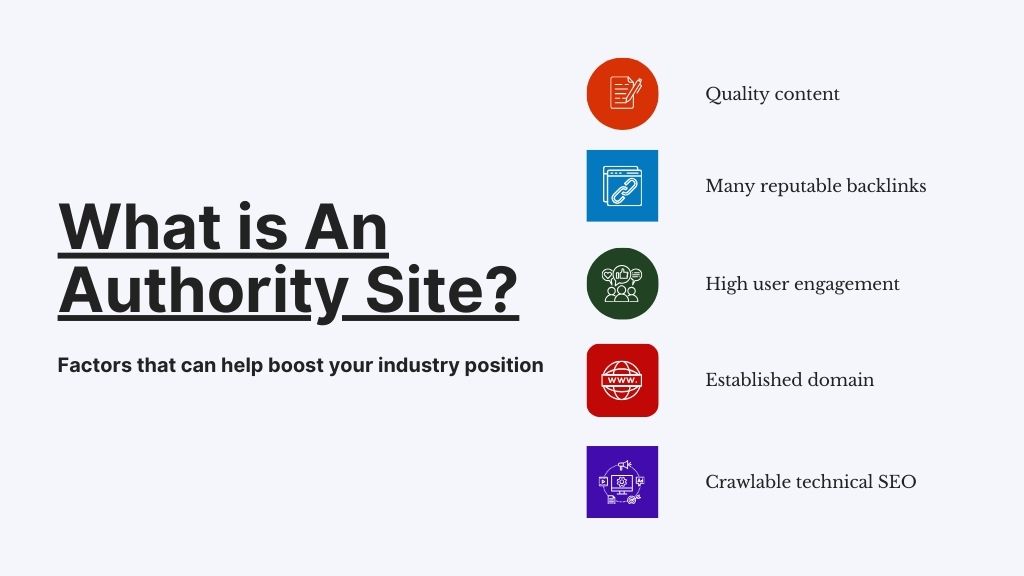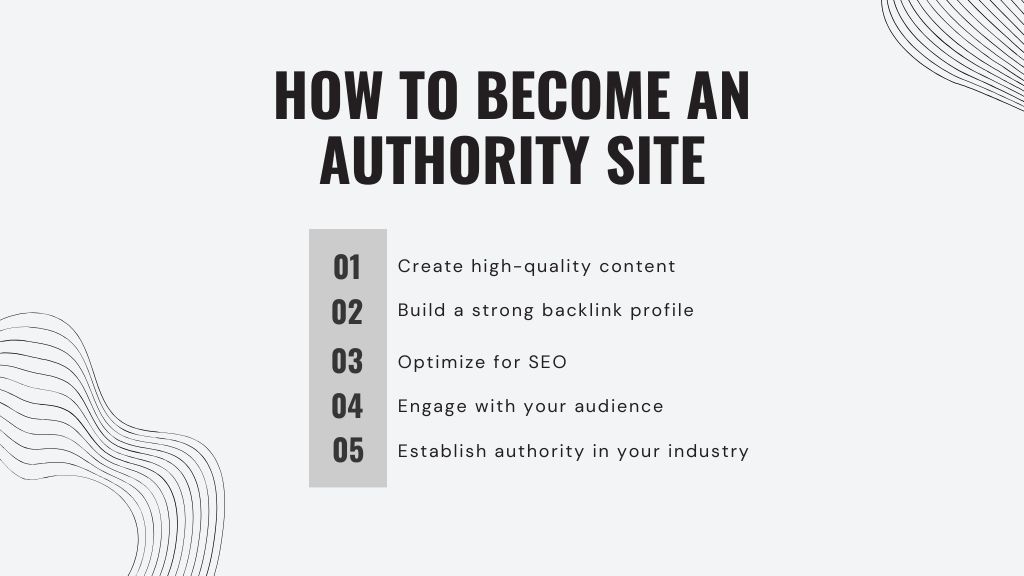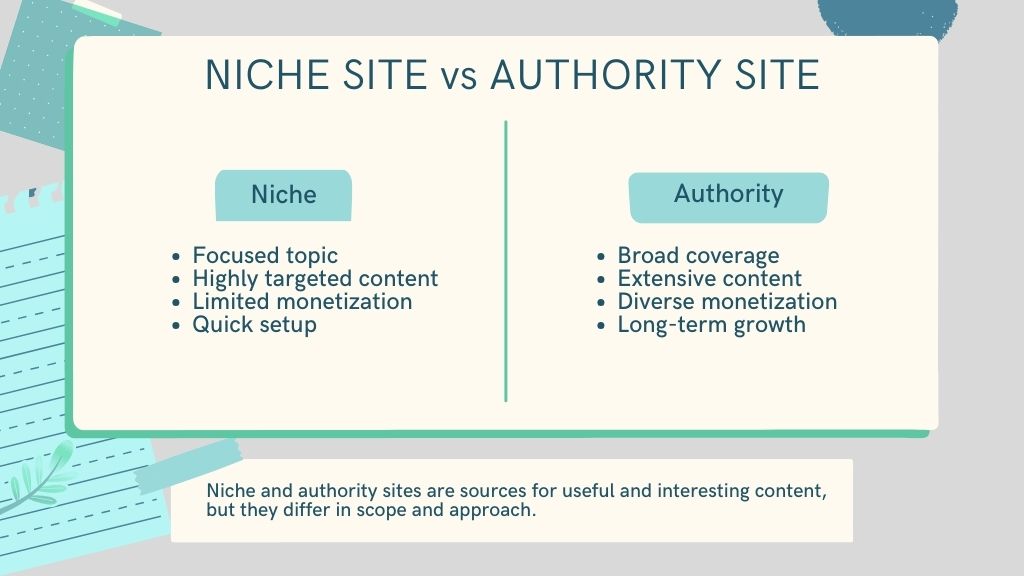What is An Authority Site?

The term “authority site” is often used to describe a website that stands out due to its credibility, trustworthiness, and extensive content. If you’re looking to succeed in the online space, you must understand what constitutes an authority site and how to build one. Let’s explore the key aspects of authority sites, including how they differ from niche sites, how to become one, and how to measure site authority.
In this article:
- What Does It Mean When a Site Has Authority?
- How Do You Determine the Authority of a Site?
- What is a Good Site Authority?
- How to Become an Authority Site
- What is the Difference Between a Niche Site and an Authority Site?
What Does It Mean When a Site Has Authority?
When a site has authority, it means that it is recognized as a credible and trustworthy source of information within its industry. This recognition comes from several factors:
- Quality Content: The site consistently publishes well-researched, valuable, and original content that addresses the needs and questions of its audience.
- Backlinks: Other reputable websites frequently link to the site, indicating that its content is valuable and reliable.
- User Engagement: The site enjoys high levels of user engagement, such as long visit durations, low bounce rates, and positive interactions (comments, shares, etc.).
- Domain Age: Older domains generally have more authority due to their longevity and established presence online.
- Technical SEO: The site follows best practices for search engine optimization, ensuring that search engines can easily crawl and index it.
How Do You Determine the Authority of a Site?
Several tools and metrics can help determine a site’s authority:
1. Domain Authority (DA)
Developed by Moz, Domain Authority scores range from 1 to 100, with higher scores indicating greater authority. Factors include the number of backlinks, linking root domains, and the quality of these links.
2. Page Authority (PA)
Also by Moz, Page Authority measures the ranking strength of a single page within a site. It uses similar factors as DA but focuses on individual pages.
3. Trust Flow and Citation Flow
Developed by Majestic, Trust Flow measures the quality of backlinks, while Citation Flow measures the quantity. A higher Trust Flow indicates better link quality.
4. Domain Rating (DR)
Ahrefs’ Domain Rating shows the strength of a site’s backlink profile compared to others in their database. It’s a logarithmic scale from 0 to 100.
5. Organic Search Traffic
The amount of traffic a site receives from organic search can also indicate authority. Tools like Google Analytics, Ahrefs, and SEMrush provide insights into organic traffic trends.
6. Engagement Metrics
Metrics such as bounce rate, average session duration, and pages per session from Google Analytics can give an idea of how users interact with the site, indirectly indicating authority.
What is a Good Site Authority?
A good site authority varies by industry and competition, but generally:
- Domain Authority (DA): A DA score above 50 is considered strong. Top sites often have DA scores above 80.
- Page Authority (PA): Similar to DA, a PA score above 50 is strong for individual pages.
- Trust Flow: A Trust Flow above 30 is generally good, indicating high-quality backlinks.
- Domain Rating (DR): A DR above 60 is excellent, showing a strong backlink profile.
Industry Benchmarks
- Niche Blogs: DA of 30-50 can be good.
- Corporate Sites: DA of 50-70 is often seen.
- Major Publications: DA of 70+ is common.
How to Become an Authority Site
Becoming an authority site involves a strategic and sustained effort in several key areas:

1. Create High-Quality Content
- Research Thoroughly: Each piece of content should be well-researched, accurate, and provide unique insights to boost author authority.
- Originality: Avoid duplicate content and strive to offer something new that adds value.
- Consistency: Regularly update the site with fresh content to keep the audience engaged and coming back.
2. Build a Strong Backlink Profile
- Guest Blogging: Write articles for other reputable sites to get backlinks.
- Outreach: Contact influencers and bloggers in your industry to share your content.
- Create Link-Worthy Content: Develop comprehensive guides, infographics, and original research that others will want to link to.
Link Genius helps you find guest posting opportunities, manage communications, and track your progress, streamlining your outreach campaigns. By automating many tasks, Link Genius removes barriers and makes it easier to build a strong backlink profile without needing a large team. It’s a valuable resource for anyone looking to enhance their site’s authority efficiently.
3. Optimize for SEO
- Keyword Research: Use tools like Google Keyword Planner or Ahrefs to find relevant keywords.
- On-Page SEO: Optimize titles, meta descriptions, headers, and content for target keywords.
- Technical SEO: Ensure fast load times, mobile responsiveness, and proper site structure.
4. Engage with Your Audience
- Social Media: Promote your content on social media platforms and engage with your followers.
- Comments and Feedback: Respond to comments on your site and social media to build a community.
- Email Marketing: Build an email list to keep in touch with your audience and share new content.
5. Establish Authority in Your Industry
- Public Speaking: Participate in industry conferences and webinars.
- Publications: Contribute to industry magazines and journals.
- Networking: Build relationships with other experts in your field.
What is the Difference Between a Niche Site and an Authority Site?
While both niche sites and authority sites aim to provide valuable content, they differ significantly in their scope and approach:

Niche Site
- Focused Topic: Niche sites concentrate on a very specific topic or audience. For example, a site about organic gardening or vintage car restoration.
- Limited Content: Due to the narrow focus, the content is more limited in scope, often targeting long-tail keywords.
- Monetization: Niche sites often rely heavily on affiliate marketing and targeted ads for revenue.
- Quick Setup: These sites can be set up relatively quickly and start attracting traffic with less content.
Authority Site
- Broad Coverage: Authority sites cover a wide range of topics within a broader industry. For example, a site about general gardening tips or automotive reviews.
- Extensive Content: They produce a large volume of content, targeting both broad and specific keywords.
- Diverse Monetization: Authority sites may use various monetization strategies, including ads, affiliate marketing, sponsored posts, and even selling their own products or services.
- Long-Term Growth: Building an authority site takes time and consistent effort but results in a more stable and sustainable traffic flow.
Becoming a Trusted Online Presence
An authority site is a valuable asset in digital marketing and SEO, providing reliable, comprehensive content and enjoying a high level of trust from both users and search engines. Building such a site requires consistent effort in content creation, backlink building, SEO optimization, and audience engagement.
Using a tool like Link Genius lets you focus on creating high-quality content and strategic planning by automating your outreach campaign. Sign up today and become a trusted online presence with ease.
